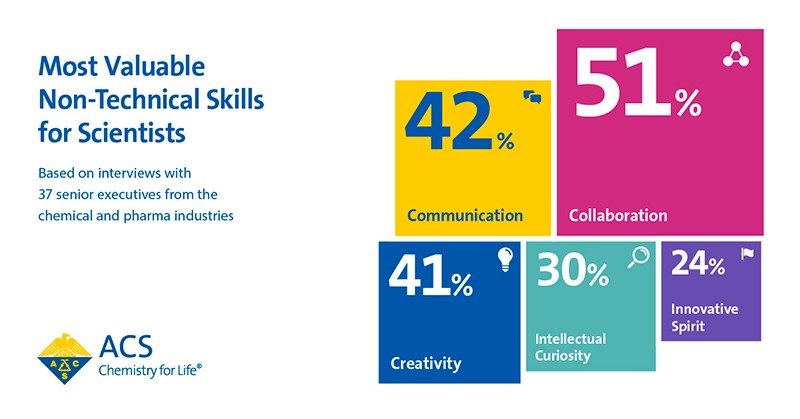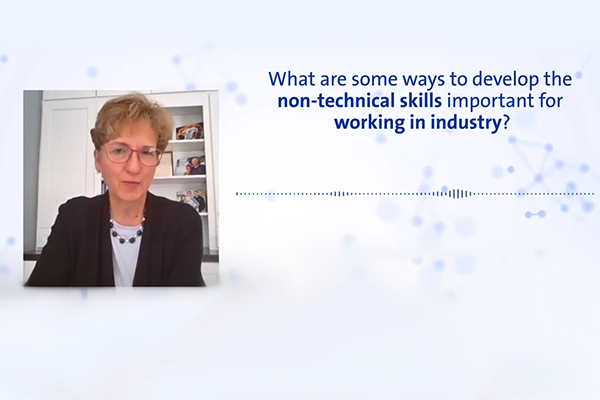
Victor Aguilar, Chief Research, Development and Innovation Officer, P&G, 1/28/2021
"First, I would say that there are many skills that I personally value and are important in the context of each individual. It is the combination of those skills that makes everyone unique. This said, I believe that Innovation is a team sport that requires not just technical skills and mastery but a lot of creativity and imagination. And I believe creativity is an acquired skill that comes from being very inclusive, which is the ability to listen to others, seek and understand different points of view, create diverse teams, and then integrate all of this information into something bigger than the original idea.
Hence, harnessing creativity requires a great deal of collaboration. Another important skill when it comes to innovation is the willingness to pursue uncharted territories, to constructively challenge the status quo, and to take risks to achieve greater goals and objectives."
Charlotte Allerton, Head of Medicine Design, Pfizer (2/6/2020)
"At Pfizer our primary stakeholders are the patients. Patients are waiting for breakthrough medicines. We hold this front and central to all the work that we do, and it brings an urgency and courage to our work that I highly value in our colleagues.
All scientists need to have integrity, resilience and tenacity to be successful. In science we have many setbacks, and I really value colleagues who are transparent about their learnings, pick themselves up after a failure, take a step back and work out a new route to the goal. We have to do this time and again in drug discovery, as continuous learning is part of our overall success.
At Pfizer, our inventions and breakthroughs come from working in diverse teams of colleagues. Being able to collaborate broadly, listen to others’ views, advocate for your own, cut through the complexity to a clear plan and build trust through acknowledging the contributions of others are all skills that I see as instrumental to success."
Gerard Baillely, Vice President R&D Corporate Functions, P&G (8/29/2019)
"Let us try a theme and variations on the letter C, shall we? I look first and foremost at the combination of Conviction, Critical thinking and Curiosity (Voracious curiosity for learning, for solving problems, for inclusion of diverse vantage points from colleagues, interdisciplinary or emerging fields, external partners, backgrounds). When individuals have these 3 Cs, they have huge potential for growth, for rallying partners and ultimately build competitive advantage and value creation for their company through non- obvious insights, smart reapplication of proven concepts and rigorous science.
In P&G, we adopt “Leading with Courage” as a performance vector, congruent with these three Cs. Of course, the 4th and 5th C’s (Communication and Confidence) are mentioned by all as a point of entry to engage senior managers or investors. Yet, for R&D, those skills can be learnt and are vain without the substance of the first 3 Cs. I will also venture to say that R&D leaders must have more patience with listening to consumers or technologists who have diverse communication skills or levels of confidence. This is a prerequisite to discern the next non-obvious insight that can solve problems or create opportunities in our fast moving consumer goods industry."
John Banovetz, Senior Vice President, Research and Development and Chief Technology Officer, 3M (4/9/2019)
"At 3M, we highly value the ability to collaborate and work on a cross-functional team. This is a key component of our innovation model as inventions and technical advances rarely come from a single individual. The diversity of thought and additive power of teams helps creative new and differentiated solutions for our customers."
Billy Bardin, Global Operations Technology Director, Dow (4/15/2021)
"Succinct and direct communication capability combined with the ability to frame an opportunity within business terms so that leaders and stakeholders understand the technology value proposition are critical. One can have the best idea, but if a leader doesn’t understand it, no opportunity for commercialization will be forthcoming.
The role of our scientists is to provide robust technology solutions for business opportunities and to help create business opportunities for emerging, valuable, and competitively advantaged technology. In order to accomplish this, our scientists must be able to communicate with technical experts as well as with finance, business, commercial, and marketing leaders. The flexibility in communication style and approach is not always easy to develop or master, but when done well, can make a scientist or engineer an extremely influential leader.
Innate curiosity and initiative are common characteristics demonstrated by many of our most successful scientists and engineers, and are two of the traits on which I focus when I’m interviewing potential candidates. Team members that question how or why things work and with a desire to improve them or develop better solutions can help to elevate everyone’s thinking. They bring unique perspectives to problems, which often leads to more elegant solutions than what may have been developed otherwise.
David Bem, Chief Technology Officer and Vice President Science and Technology, PPG (9/26/2019)
"Our global research & development team at PPG has a true spirit of innovation and invention. It is important for manufacturers like PPG to look beyond current market needs, and develop coatings that will serve future customer needs – needs they may not even recognize yet.
For example, we see profound changes coming in the transportation industry with the future of mobility. With the ongoing development of self-driving and autonomous vehicles, PPG has a strong opportunity to enable and enhance the future of transportation through next-generation coatings, including cathode coatings for electric-vehicle batteries, coatings that help self-driving cars detect other vehicles and infrastructure around them and anti-fingerprint coatings for interior vehicle applications.
By anticipating these changes and having an organization that is constantly looking for new opportunities, PPG will contribute to the future of change."
Karin Briner, Vice President, Global Discovery Chemistry, Novartis (2/4/2021)
"Our mission at Novartis to reimagine medicine and invent novel breakthrough therapeutics, bringing them with urgency to the patients, takes many talented scientists from diverse disciplines who work together through complex, unprecedented problems toward their one common goal. Therefore, the ability to deal with ambiguity and cut through complexity, turning setbacks into learning opportunities, being open to new ideas, and a collaborative, inclusive mindset, are in my opinion, important non-technical skills contributing to success."
Serban Cantacuzene, Vice President R&D Americas, Air Liquide, Inc. (10/10/2019)
"I value their creativity, their out-of-the box thinking, their skills to communicate well internally and externally, their team working spirit, as well as their capacity to constantly adapt to new topics and environments. Last but not least, I should mention the customer and patient focus, that drives everyone’s passion at Air Liquide and fuels our engagement."
Chuck Crawford, Chief Innovation Officer, GOJO Industries (3/4/2021)
"There are many, and this is also an area where a detailed answer can be quite individualized, leveraging the skills of our team members against the needs of the business. However, those non-technical skills that tend to be common denominators include collaboration, communication, and creativity. Further, the ability to connect technology to needs – to connect what is possible to what is needed – is a prized skillset. These are highly coveted skills in any organization, and I have found this to be particularly true here at GOJO."
Nicolas Cudré-Mauroux, Chief Technology Officer, Solvay (11/21/2019)
"Our mission is to create value by developing solutions for our customers. The technical competencies of our scientists are absolutely amazing. Focusing these competencies on the right projects requires marketing skills and, simply, the ability to ask the right questions and to listen to the answers from our customers. Great scientists who have the ability to do that and to connect with other people, scientist or not, are the real stars in our organization."
Alexa Dembek, Chief Technology and Sustainability Officer, DuPont (11/7/2019)
"I know every CTO would say this, but our scientists are about the most innovative and driven group of professionals you would ever come across. I am continually inspired by their dedication and commitment to be on the leading edge of solutions for our customers and society.
That said, by the time I get to interview candidates for our most critical positions in the company, I already assume they’re smart. That’s a given. What I look for then is the quality of thought they exhibit, outside of a laboratory environment. What is her strategic perspective to problem solving? Is she a good communicator and can she lead teams effectively? I learn a lot by the quality of people’s questions. Curious people ask great questions and you must be continually curious to succeed at DuPont. And you also need to collaborate across diverse teams to get to the best solutions."
Peter Eckes, President of Bioscience Research, BASF (9/12/2019)
"Every innovation has a disruptive component. This requires change, which makes successful innovation so challenging. In this context I see two skills as very helpful: Resilience and the ability to inspire others for a new idea."
Margaret Faul, Vice President, Process Development, Amgen (8/6/2020)
"Process Development, which is the art of converting molecules into medicines, is an increasingly complex business that requires the partnership and collaboration of a broad and diverse team, including manufacturing, regulatory, clinical, quality, and supply chain -- to mention a few. Thus, one of the key attributes for success is “collaborate, communicate and be accountable”.
Our scientists need to be able to seek input and involve key stakeholders in important decisions. In addition, they need to be able to understand what is required from each organization and to be open to welcoming diverse opinions, and driving to decisions that support the successful advancement of our molecules. They also need to be able to clearly communicate decisions and rationale effectively, and when a decision is made, be accountable for implementing the decision rapidly. Obviously, this is not always easy, but a “One Amgen” approach ensures success for all, and when a molecule is successfully launched, a win for patients."
Vikram Gopal, Sr. Vice President, Technology, Ascend Performance Materials (6/20/2019)
"At Ascend, we believe collaboration and open feedback drive innovation. We expect everyone, not just our scientists, to work within and across teams to understand the full scope of problems and develop sound, sustainable solutions. Innovation involves failure, especially when you are pushing technology to its edge. It is critical for team members to demonstrate humility for what we know and respect critical feedback."
Neal Gutterson, Sr. VP and CTO, Corteva (1/16/2020)
"For starters, emotional intelligence. It’s critical. The work we’re entrusted with is centered on collaboration and co-creation, and that requires a keen understanding of how to work with people and inspire, engage and build networks of trust.
Closely related to that, I think, is having a strong sense of intellectual curiosity—that innate drive to look for better ways to do things for farmers, consumers and society at large.
That tends to go hand-in-hand with another trait I value in people, which is passion. Passion for purpose, for transforming agriculture and for delighting our customers.
Today we’ve also got to be digitally savvy, and as comfortable with using digital computational tools as we are with algebra. Digital literacy is foundational."
Stephan Habif, Senior Vice President, Research & Innovation, L'Oreal (11/19/2020)
"Passion for Beauty, integrity and respect. I also value hard work, resilience, courage, curiosity, and pragmatism: getting the job done."
Jason Harcup, Global Vice President Personal Care Research and Global Vice President, Prestige Division, R&D, Unilever (5/20/2021)
"I value “values” themselves: Drive, judgement and the desire to change everything we do for our consumers and our planet for the better."
Christine Heckle, Research Director, Corning Incorporated (4/22/2021)
"Science is, at its core, a creative endeavor. One of my favorite quotes is from Dr. Mae Jamison, who said, “The arts and sciences are avatars of human creativity.” People who can keep two disparate thoughts in their mind at the same time, and work across disciplines, tend to be very creative in solving problems and coming up with new ideas. Therefore, individuals who make an effort to build a network of diverse connections and are open to learning new things will find a way to leverage those connections or knowledge in a new and interesting way.
Karen LaMonte, a fabulous glass artist, talked about learning, reading, studying, and how it all seeded ideas in her brain that – all of a sudden – would pour out of her like water released from a cloud. We value scientists (and engineers and technicians) who are open, collaborative, engaging, always learning, and open to new ways of doing things."
Jennifer Holmgren, CEO, LanzaTech (10/29/2020)
"Asking questions and challenging the status quo. Being able to attack data and read between the lines is often what helps us move forward. Would also add (not really a skill) but perseverance, as this is a tough gig and we have a bit more to go on our journey!"
Patricia Hubbard, Sr. Vice President and Chief Technology Officer, Cabot Corporation (8/15/2019)
"There are two non-technical skills that are extremely valuable for any chemist working at Cabot or in the industry. The first is critical thinking, and the second is good communication. As chemists progress in their careers, their roles often require that they are able to influence both technical and non-technical audiences from inside and outside of their organizations and for me, critical thinking and good communication have been key to building influence.
These “softer skills” come naturally to some, but all employees can continue to improve them over their careers. At Cabot, we are dedicated to creating a learning culture and provide a variety of training opportunities for employees at various levels in their careers. In addition, what I find often more important is the individualized coaching many receive from our own internal leaders, and leadership development specialists, who have expertise working with technical professionals."
Philippe Knaub, Senior Vice President and Chief Technology Officer, FXI (2/20/2020)
"Several non-technical skills are critical to the success of a scientist at FXI and I would argue in most modern research groups. The first one is team work and how a scientist can interact and integrate within a group. Any individual contributor will be sublimated when immersed in the right team and see his/her efforts increase in an exponential manner.
Hand in hand with teamwork, I value very highly individuals with great interpersonal skills. They not only excel within a team but also vertically and horizontally across the organization. They contribute to the energy of a group and are the catalyst that leads to excellence and excitement that make the researchers get up every day and look forward to coming to work and making a difference.
Classical leadership traits, like hard working and driving for results, can of course not be forgotten. One last skill I would like to highlight is persistence. One thing we all learn in R&D is that we more often fail than succeed and the researchers with a high “batting average” are usually the ones that take low risks and work on line extension projects only. Statistics don’t lie (or rarely do) and break-through projects have a much higher chance to fail than to succeed. And the ones that succeed have many disappointments and redirections along the way, and only succeed thanks to the persistence of the individuals that work on them. This trait of character is most efficient when associated with a touch of optimism: the people seeing the glass half full and always looking for the bottle to top it off.
I realize that it may take more than one person to do all that, which brings me back to the teamwork theme I started with and the team composition. I have spent a lot of time over the years and paid a lot of attention to find the right blend of individuals that create the perfect team. At the time I worked for Dow Chemical, one of our great R&D leaders, Kurt Swogger, studied his group and found out that. Having more creative minds who typically cannot implement their ideas or even sort out the good ones from the wild ones, leads to an organization with a very robust front end full of ideas but no one to bring them to conclusion. On the other hand, an organization with too few creative minds and only finishers ends up working only on value preservation, line extension and never invent anything new."
Tim Knavish, Executive Vice President, PPG (5/28/2020)
"There are a few core strategies that I’m passionate about to drive a successful, engaged and diverse team. I believe in working hard to implement positivity, embracing change, maintaining high energy, trusting your people, and celebrating successes within our global teams.
One thing that I continue to impress upon individuals and teams within our organization is to be bold earlier, and don’t be afraid to take chances. It’s my advice to all PPG employees, regardless of where they are in their careers. Looking back, I wish my younger self received this advice.
I’m also a big believer in drawing motivation from the people around me and encouraging others to do the same. I like to win as a team, not as an individual – winning is cool when it’s collaborative. Finally, I’m a big believer in hiring the right talent for the right roles, and trusting them to lead with their expertise. I much prefer to lead alongside our talented people."
Ellen Kullman, President & Chief Executive Officer, Carbon (3/19/2020)
"We have a world-class team at Carbon that includes scientists and engineers who aren’t just well-recognized in their fields, but who are curious about many fields and who are collaborative—people who are motivated to see how science can be applied to help solve challenges across a range of disciplines and industries, people who think holistically and have the imagination and drive to invent new ways of approaching practical, everyday problems. This inspires me every day!"
Bob Maughon, Executive Vice President, CTO and CSO, Sabic (4/30/2020)
"There are three areas that I see as critical to advancement and impact:
- Performance: The scientists that can collaborate, within their teams and across all functions, are the ones that can translate their technical acumen into business results – this is the difference between innovation and invention.
- People: Scientists should be devoted to the development of the next generation of scientists, challenging, and supporting younger talents but as well taking ownership in enabling their success. True leadership is not demonstrated through individual achievement, but instead through inspiring, mobilizing, and enabling others.
- Pipeline: Willingness to take risk and bring new ideas forward. All of our researchers have strong technical skills, but those researchers who are willing to speak out, take risks, champion new technologies, and inspire others to join them, are the ones that stand out.
The desired behaviors, expressed in the SABIC Leadership Way, of being a Talent Champion, a Collaboration Partner, an Innovation Pioneer, and an Excellence Driver, are very much aligned to these areas of focus."
Mark Noe, Vice President, Pfizer (2/18/2021)
"One important facet of work at Pfizer is our ability to work as part of diverse teams. Pharmaceutical research and development requires strong teamwork owing to the complexity associated with designing a new medicine that has all the properties required to be a transformational medicine. As such, our scientists need to be open to others’ perspectives, willing to share their own ideas and able to constructively challenge others regardless of their level in the company.
In doing each of these things, we ensure that the best ideas are considered and implemented. I think it is important for our scientists to expand their professional network inside and outside the company, which requires a willingness to go beyond their own laboratory or local work environment and learn about the scientific challenges that others are facing – as well as share their own. Doing so can bring diverse and often valuable outside perspectives to solving problems, without some of the blinders associated with working on a project for a long time.
Finally, because we work in an industry that thrives based on innovation, the ability to think creatively about how to solve a problem is crucial. Often, innovation requires taking a step back and discarding assumptions that limit how one approaches solving a problem, and as mentioned above, being open minded to new thoughts that you or others might generate."
William Provine, President and Chief Executive Officer, Delaware Innovation Space (12/17/2020)
"Most of the time, in a science-based innovation company like DuPont, it is hard to differentiate or separate the importance of the technical and non-technical skills in one’s successes, as success or progress either in projects, business, or one’s career is built upon the integration of such skills in solving a challenge or puzzle, or making progress towards a business objective.
When I find myself in my most impactful or productive state, I’m definitely actively learning, assessing and integrating information, connecting and listening to others, and studying the fundamentals at play in the internal and external landscape. I find that I’ve had the most success in my career from being adept in my ability to work across functional, cultural, and technical domains; creating strategic plans and objectives and driving for results and impact in very complex landscapes.
I would encourage all early career scientists and engineers to be an active learner, connect and listen/learn from others, and learn to constantly adapt to new information and keep focused on making progress, even when there exists large aspects of ambiguity and many moving parts."
Jag Reddy, Vice President, Strategy and Growth, Grace (12/10/2020)
"First, it’s important to remember that ART includes research scientists from both Chevron and Grace, and they form the core of scientific innovation. In the Grace Value Model, we talk about Great Talent and our High-performance Culture.
Unless a technical person is also a talented collaborator and communicator, their technical skills alone will not achieve the best results—for themselves or the JV. We expect everyone, including our scientists, to be team players, able to see the big picture and align with business goals. At both Grace and ART—and, I believe at Chevron—team success is more important than individual success."
Carlonda Reilly, Vice President and Chief Technology Officer, Kennametal (11/12/2020)
"I am proud that our scientists have a passion to understand unmet customer needs and are able to apply their technical knowledge to solve our customers’ greatest challenges. Additionally, our most effective scientists are the ones who can communicate and collaborate cross-functionally both internally and externally to deliver the best solutions to the customer."
Robert Reiter, Head of R&D, Crop Science, Bayer (5/13/2021)
"Given the collaborative nature of our work and the extra challenges we face in the digital sphere, I’ve come to really value openness and a strong sense of resilience in my team. So much of science is finding roadblocks and then figuring out how to overcome them. It takes someone who is personally driven, open to trying new things, and willing to take those roadblocks head on to find success in the field and the lab. In addition, curiosity is key. You always have to be thinking about what’s to come and be invested and engaged enough to seek our new answers and new solutions."
Marcus Remmers, Chief Technology Officer, DSM (12/12/2019)
"I appreciate scientists who show an entrepreneurial spirit: speaking up, taking calculated risks and initiative, and having a sense of urgency. That’s why I’m pleased that at DSM we develop these skills through specific programs.
Also, self-reflection is very important: we want people to take time to reflect on what has worked well for them and others, how they can do better, and what they can learn. Trying new things is part of this – I like the Pippi Longstocking quote “I have never done it, so I will probably be good at it."
Finally, I value storytelling. Trust in institutions and government is at an all-time low: we can’t assume any longer that people will automatically accept scientific evidence. We need to learn to discuss our solutions in a way that nonscientists can understand and appreciate. To address this need, we offer storytelling workshops for our R&D community."
Seva Rostovtsev, Director, Head of Discovery Chemistry, FMC Agricultural Solutions (5/27/2021)
"I look for the person’s ability to work in interdisciplinary teams. Such work requires many non-technical skills, including the ability to communicate effectively, ability to listen carefully, desire to learn something new, patience, and capability to build trust."
Florian Schattenmann, Chief Technology Officer and Vice President for Innovation and Research & Development (R&D), Cargill (3/5/2020)
"Collaboration and communication. Most of the opportunities in front of us will require more and more interdisciplinary R&D work. We just talked about new innovative alternative protein solutions. A lot of people with different backgrounds, often based in different locations, have been involved to make it happen. From the chemistry of food ingredients, including what’s going on during cooking, to materials science to processing and engineering and so on.
Collaborating seamlessly across a wide range of technical and scientific disciplines and finding a common language are critical components to success."
Jyoti Seth, Vice President of Technology, GCP Applied Technologies (10/24/2019)
"Scientists’ creativity is very valuable to the company. Scientists need to combine that with business acumen; practicality; thinking through the commercial process, from bench scale to large scale; speed and collaboration. The open mindedness of the scientist is especially valuable so that they can use their available knowledge and resources to move the project forward. Thinking about the team over individual contributions is also highly valued."
Kathleen Shelton, Vice President and Chief Technology Officer, FMC Corporation (8/1/2019)
"Two critical skills that every new employee needs to be successful are the ability to effectively communicate to non-technical audiences and strong business acumen. These skills are new to our scientists and integral to advocating for new ideas, getting the resources they need, and building business relationships. As an ag sciences company, the partnership between R&D and the business is vital to achieving company objectives.
We try to help our scientists understand the business environment through special projects that get them out of the lab and working with colleagues in the business as well as some traditional, classroom-based learning."
A.N. Sreeram, Senior Vice President & Chief Technology Officer, Dow Chemical Company (4/16/2020)
"I would have to say the combination of passion for great science and engineering, working collaboratively across teams and time zones, and perseverance that finds a way to solve seemingly intractable problems.
There are certainly many ways to be successful, but time and time again I see it is the folks that just won’t quit that get the job done. I like to think of the Dow diamond as a kind of map of what we do. We start with a problem to solve. We expand the search space, considering and evaluating many diverse ideas with inputs from across our global organization, from scientists and engineers with different backgrounds and experiences. We then begin the process of narrowing toward a practical, viable solution.
Ideas and opportunities become products solving customer needs, thanks to the passion and perseverance of Dow people. Like the diamond, we start at a point in space, diverge and expand with vibrant ideas, and converge to a different point in space with a solution that the marketplace demands."
Dan Sutherlin, Vice President of Discovery Chemistry, Genentech (6/18/2020)
"Curiosity, creativity, collaboration, and independence. Innovation comes from looking at difficult problems in unique ways and applying your technical expertise. Building on that creative spark through teamwork and feedback from others and then following up with the initiative to get things done is a recipe for success."
Wendy Young, Senior Vice President of Small Molecule Drug Discovery, Genentech (4/23/2019)
"It takes a strong team of individual, highly talented scientists working together to develop a new innovative medicine. In those individual scientists, we value a wide variety of non-technical skills: excellent communicators, good listeners, great collaborators, risk takers, motivators, truth seekers – and, most importantly, a clear passion for helping patients."
This article has been edited for length and clarity. The opinions expressed in this article are the author's own and do not necessarily reflect the view of their employer or the American Chemical Society.
Copyright 2022 American Chemical Society (All Rights Reserved)










